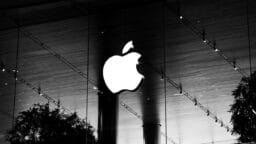This year, Nvidia, a titan in AI chip manufacturing, ascended to become the most valuable company in global history, eclipsing both Microsoft and Apple. The latter two are increasingly perceived as laggards in the pursuit of AI technological supremacy.
Reuters
12 September 2025, 01:25 pm
Last modified: 12 September 2025, 01:35 pm
An illustration projected on a screen shows a robot hand and a human one moving towards each other during the ‘AI for Good’ Global Summit at the International Telecommunication Union in Geneva, Switzerland, on 7 June 2017. Photo: REUTERS/Denis Balibouse
An illustration projected on a screen shows a robot hand and a human one moving towards each other during the “AI for Good” Global Summit at the International Telecommunication Union in Geneva, Switzerland, on 7 June 2017. Photo: REUTERS/Denis Balibouse
Highlights:
- Oracle enters the top 10 US companies by market capitalization.
- The eight most valuable AI-centric firms constitute approximately 30% of the S&P 500.
- Nine of the ten most traded stocks over the past five days are linked to AI developments.
The fervor surrounding Wall Street’s “AI trade” has propelled stock market indices to unprecedented heights this year. Concurrently, Oracle’s remarkable price ascension has induced renewed investor enthusiasm.
Oracle’s shares surged by 36% on Wednesday, September 10, as the company reported a significant uptick in demand for its cloud services from AI-centric enterprises. This surge inflated its market capitalization to $922 billion, surpassing that of Eli Lilly, JPMorgan Chase, and Walmart.
The remarkable gains this year for Oracle, Broadcom, Palantir, and other technology firms underscore how AI has increasingly dominated financial markets, notwithstanding periodic corrections attributed to concerns over the sustainability of this rally.
In contrast, the “Magnificent Seven,” the megacap trade that once propelled stocks to new heights, has recently faced challenges as shares of both Apple and Tesla have declined.
“Just as apprehensions about the slowing growth of AI and its supporting infrastructure began to surface, Oracle reported numbers that took everyone by surprise, reigniting interest in the entire sector,” remarked Peter Tuz, president of Chase Investment Counsel in Charlottesville, Virginia.
“This resurgence signals that the AI trade is reclaiming its pivotal role in shaping equity market dynamics,” he added.
Oracle now ranks among Wall Street’s ten most valuable companies, with nearly all recognized as leaders in AI, including giants Nvidia, Microsoft, Alphabet, and Amazon.
Nvidia itself reached a historic valuation as the world’s most valuable company, displacing Microsoft and Apple, as investors grow wary of the latter’s lagging performance in the burgeoning AI arena.
Although Nvidia’s stock dipped approximately 2% following a less-than-encouraging sales forecast on August 27, its market valuation remained robust, totaling $4.3 trillion as of Wednesday’s market closure.
In the interim, technology shares have stabilized after a tumultuous month, with the sector reflecting a notable increase of over 16% thus far in 2025.
Following Wednesday’s surge, Oracle’s market capitalization stood at $922 billion, closely trailing Berkshire Hathaway at $1.06 trillion, just behind Tesla’s $1.12 trillion valuation.
On September 9, Oracle unveiled four sizeable multi-billion-dollar contracts, strategically capitalizing on the industry-wide pivot led by companies like OpenAI and xAI, which are propelling aggressive investments to secure the substantial computing resources necessary for AI advancement.
Presently, the eight leading AI-centric firms in the U.S. constitute nearly 30% of the S&P 500. These companies have emerged as the most significant contributors to the benchmark index’s upward trajectory in recent months.
The ascension in shares of Nvidia, Microsoft, Broadcom, Meta Platforms, Alphabet, Amazon, Palantir Technologies, and Oracle collectively accounts for approximately half of the S&P 500’s 11% increase witnessed thus far in 2025, according to a Reuters analysis of LSEG data.
S&P 500 valuation. Infographic: Reuters
S&P 500 valuation. Infographic: Reuters
In the past five trading sessions, nine of the ten most actively traded companies on Wall Street have been affiliated with AI, with Apple being the sole exception. Nvidia topped the trading charts, averaging $29 billion in trades daily, according to LSEG data.

The exuberance surrounding AI has extended beyond traditional tech sectors, invigorating shares of utilities and energy equipment companies essential for meeting the burgeoning energy demands triggered by this technological boom.
Industrials like GE Vernova, along with utility players such as Constellation Energy and Vistra, have also reaped substantial benefits amid the AI frenzy over the past year.
This enthusiasm for AI-related stocks has propelled the U.S. stock market’s valuation to levels exceeding historical averages. The S&P 500 is now trading at over 22 times the expected earnings of its constituents, marking its highest valuation in four years, according to LSEG Datastream.
In contrast, the average price-to-earnings (P/E) ratio has been around 18.6 over the past decade.
The technology sector, which carries the greatest weight within the S&P 500, has witnessed its forward P/E ratio climb above 28, significantly above its ten-year average of roughly 22, in accordance with LSEG Datastream.
After the impressive surge on Wednesday, Oracle’s stock value has nearly doubled year-to-date, while other major tech stocks have also showcased remarkable growth. As of Wednesday, Palantir shares have surged 120% in 2025, and Broadcom’s shares have escalated by almost 60%.
“I was genuinely taken aback by the scale of Oracle’s jump; it underscores the vitality remaining in the AI trade and the substantial financial resources still poised to flow into it,” commented Chuck Carlson, chief executive officer at Horizon Investment Services in Hammond, Indiana.
Source link: Tbsnews.net.






